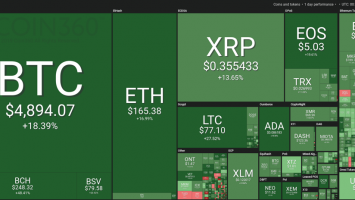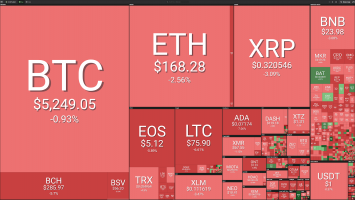The J.M. Smucker Company, also known as Smucker’s, has announced that it will use blockchain technology to trace Colombian coffee beans directly back to their source while allowing consumers the opportunity to support coffee farmers.
The American food manufacturer has formed a partnership with Farmer Connect — an organization committed to increasing transparency and sustainability in agriculture supply chains — to leverage IBM’s blockchain technology to trace the coffee beans of Smucker’s popular 1850 Coffee brand. Tina Meyer-Hawkes, the vice president of marketing for coffee at J.M. Smucker’s, told Cointelegraph that the move is all about providing transparency:
“By providing transparency of our supply chain, we are enabling the consumer to see the journey of their coffee from the region it was produced, to the mill, to exporters and importers.”
Blockchain for a global circular economy
Smucker’s 1850 Coffee will be the first brand in the United States to use Farmer Connect’s “Thank My Farmer” mobile app, allowing consumers to trace the product back to its origin. Farmer Connect demoed the Thank My Farmer app at the Consumer Electronics Show this year to showcase how a QR-code can be scanned to see the journey of a coffee bean.
According to Meyer-Hawkes, each bag of coffee contains a QR-code that can be scanned by a smart device. Once scanned, consumers will be directed to the Thank My Farmer website, which provides information about where the coffee was grown, processed and exported, along with the location of its roast.
Paul Chang, the worldwide blockchain leader of IBM, told Cointelegraph that while J.M. Smucker’s is not a part of IBM’s Food Trust Network, the manufacturer will use the same technology platform as Food Trust, which is powered by Hyperledger Fabric. Chang added:
“J.M. Smucker’s can establish their own network to solve the major transparency problem facing the coffee industry while leveraging the scalability, security and robustness of the technology that drives IBM’s Food Trust platform.”
Chang further noted that while blockchain technology is being used to provide transparency, the real innovation behind J.M. Smucker’s partnership with Farmer Connect is the ability to connect coffee drinkers with the farmers producing the beans. In turn, an equitable circular economy is achieved:
“Coffee is a commodity, so the price can fluctuate significantly. Some countries’ cost of production is greater versus the income generated from selling the coffee. With this new initiative, consumers can scan a QR-code on the 1850 Coffee packages to trace the beans back to their source. This also gives them the ability to contribute to several community programs in that farming environment.”
This is crucial, as it has been noted that coffee, poverty and migration are all interconnected. For example, in a recent article, GreenBiz reported that many migrants from Guatemala, most of whom are coffee farmers from the Huehuetenango province, try to cross the southern border in hopes of a better life. This all ties back to the fact that coffee is a heavily traded commodity with an extremely high export value. In 2019, an estimated $30.1 billion worth of coffee was exported globally.
While this may be, the price per pound paid to coffee farmers is based on the coffee commodities market. The C Market is a commodity system that operates like a stock market, allowing traders at the New York Stock Exchange to decide global coffee prices. In regards to this, the GreenBiz article notes:
“For several years, the C price for coffee has hovered around the farmer’s cost of production ($0.80-$1.10), which means no profit for the farmers. From a high in 2014, prices paid to farmers have plummeted by 70 percent and now dance around $1 per pound. Every pound a farmer sells, and every cup we drink, pushes a farmer deeper into poverty and despair.”
Meyer-Hawkes explained that coffee drinkers who purchase Smucker’s 1850 Coffee can learn more about Farmer Connect projects underway to support coffee producers and their families in Colombia through credit card-based donations. Projects that can be supported include providing clean drinking water for schools; coffee seedlings for smallholder farms; school supplies for local schools; and sustainable water and agriculture initiatives.
Blockchain challenges
Using blockchain doesn’t come without its challenges. According to Chang, blockchain technology provides transparency by recording data about supply chain events in the coffee’s journey. This includes which beans were used, when they were roasted, ports they were shipped to and beyond. Information about these events is then recorded on an immutable ledger, creating increased accountability for coffee producers and their supply chain partners, helping ensure the authenticity of products.
While a robust solution like blockchain can ensure traceability for major industries like the coffee sector, all parties involved must be leveraging the same information to ensure consistency. Meyer-Hawkes commented:
“In order to trace something from a coffee shop back to a farm in Colombia, you need to ensure all of the parties involved in this supply chain are using the same information, that there is a consistent set of data which everybody in the supply chain can use and trust is the truth.”
The food industry’s sustainable future
Challenges aside, Meyer-Hawkes noted that Smucker’s initiative comes at a time when more consumers are taking a purpose-driven approach to purchasing food products. This is especially relevant as COVID-19 cases continue to spike, impacting global food supply chains.
However, understanding where food comes from still remains a challenge. According to the International Food Information Council Foundation’s 2019 Food and Health Survey, 63% of respondents said it was hard to know whether the food choices they make are sustainable. In addition, among that group, 63% said environmental sustainability would have a greater influence on their choices if it were easier to understand. A recent IBM report further noted that 71% of consumers surveyed were willing to pay a premium for sustainable and environmentally responsible brands.
Chang from IBM mentioned that using blockchain technology to provide transparency into complex supply chains will indeed be a trend moving forward. This has already become apparent, as Norway’s billion-dollar seafood industry is now leveraging blockchain technology for transparency and sustainability. A recent report from Cointelegraph Consulting and VeChain also predicts that $300 billion worth of food products will be traced annually using blockchain technology over the next seven years. Chang further noted that blockchain technology can be applied to almost any industry:
“The automotive industry can leverage the same technology as the Food Trust Network uses to track lettuce and tomatoes. We know the technology works; it’s just a matter of finding the right value proposition for industry partners to join and extract value from that network.”
And while more industries are still determining whether blockchain is a suitable technology for solving supply chain challenges, it’s notable that Smucker’s has been using blockchain and may even expand this to other food products. Meyer-Hawkes said:
“From a blockchain perspective, starting with this single-origin product provides a great jumping-off point as we evaluate the potential application to other larger, more complex products. The future possibilities of blockchain-enabled supply chains are vast.”




Comments (No)